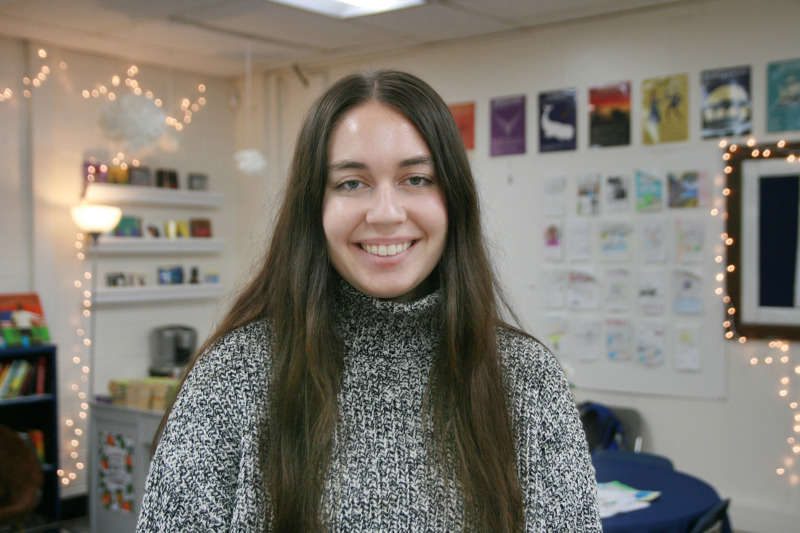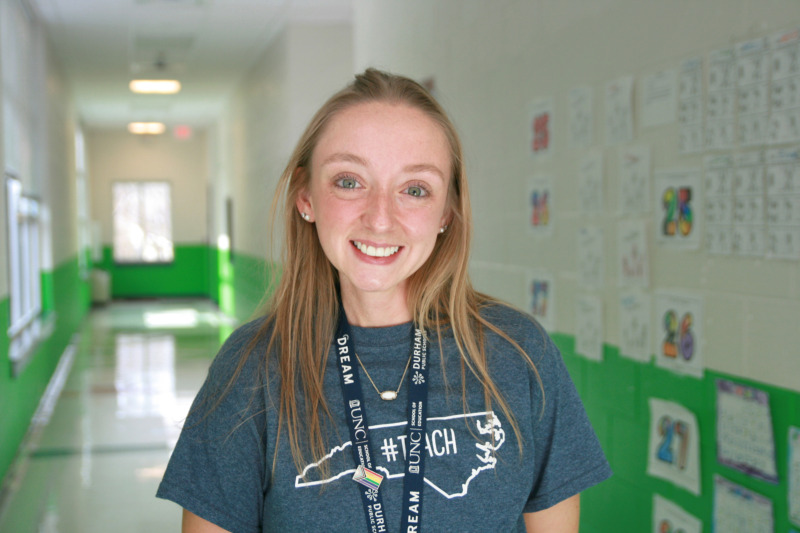
When you ask Lauren Oliver (’23 M.A.T.), a language arts teacher at Culbreth Middle School in Chapel Hill, to describe her classroom, she uses phrases and words that include “community-oriented,” “student engagement,” “inviting,” and “joy.”
Underneath twinkling fairy lights and surrounded by poster-sized book covers on the walls, tables in Oliver’s classroom are configured for small group discussions, providing a place for middle schoolers to immerse themselves in stories – ones not only from classic literature but also from their own lived experiences.
They read “The House on Mango Street” by Sandra Cisneros, which provides a template for creating their own autobiographical vignettes. Selected passages from “Little Women” by Louisa May Alcott offer a means to combine storytelling with what they’re learning in history class. Both books present Oliver with opportunities to grow her students’ reading comprehension and deepen their understanding of the world.
“In my eighth-grade class, the first half of the year includes reading a lot of coming-of-age stories,” Oliver said. “And then the second half of the year, those students learn how to tell their own story, to listen to other people’s stories, to listen closely to each other. They learn about the power of perspective.”
Oliver graduated from the School’s Master of Arts in Teaching program in 2023 and began teaching language arts classes at Culbreth Middle School in Chapel Hill-Carrboro City Schools. She earned Beginning Teacher of the Year honors for her school in 2024 and was then named Beginning Teacher of the Year for the district.
Oliver was also one of 27 teachers from across the state named as a finalist for the North Carolina Center for the Advancement of Teaching’s 2025 Burroughs Wellcome Fund North Carolina Beginning Teacher of the Year Award.
The School’s MAT program alumni often go on to receive distinctions like these. Samantha Shaw (’22 M.A.T.) was Chapel Hill-Carrboro City School’s Beginning Teacher of the Year and a finalist for the North Carolina Center for the Advancement of Teaching’s 2024 Beginning Teacher of the Year Award. In 2025, recent MAT program graduates accounted for four of Durham Public Schools’ school-level Beginning Teachers of the Year.
“Any ‘of the year’ accolade our graduates receive is notable and worthy of celebration, but our beginning teacher of the year recognitions are ones that provide an additional bit of pride for us,” said Jill V. Hamm, dean and William C. Friday Distinguished Professor of Education. “Those recognitions speak to the quality of our MAT program faculty and of the exceptional beginning teachers who leave Carolina ready to lead in classrooms for the benefit of North Carolina students.
“Like many of our students, when MAT graduates enter their first professional roles, they have the ability to transform their workplaces, making everyone around them — especially their students — better,” Hamm continued.
‘Intense in the best way’ for early career thriving
Oliver said that the MAT program prepared her to succeed early in her own classroom. She described the 13-month program, which includes a student-teaching experience over a full school year in addition to coursework, as “intense.”
“I chose an accelerated program because I knew I wanted to get into the field quickly,” she said. “It was challenging, but it made my first year of teaching go well. It enabled me to thrive in my first year.”
That sentiment is shared by fellow MAT graduates, including Megan Cannady (’22 B.A.Ed., ’23 M.A.T.), a special education teacher and Beginning Teacher of the Year at Y.E. Smith Elementary in Durham.
“The MAT program was intense in the best way,” Cannady said.

For Cannady, she said coursework was a “deep dive” into special education, gaining research-based practices to best serve the most vulnerable students within schools and working closely with faculty members with deep experience in their fields.
The yearlong student-teaching placement provided her with immediate opportunities to experience and process what she was learning in her coursework.
“By starting my student teaching in August, I was able to see the foundation of classroom management and building relationships with students,” she said. “Being able to start in August with the students was the first time I saw the first day of school from a teacher’s perspective.
“The first 10 days of school are critical in terms of building relationships. What do I expect from students? What do they expect from me? Being able to observe that [in my placement] was powerful.”
For Cannady, the format and pace of the program prepared her well for leading her own classroom as a special education teacher. Her day begins with supporting a small group of second and third graders as they work toward their reading goals. From there, she moves into a first-grade classroom to offer support, then into a kindergarten classroom to do the same. Later, she pulls students from class to work on math skills, then again to help them strengthen their social skills. In the afternoon, she leads small group sessions focused on building emotional regulation.
“Every kid is different,” Cannady said. “Their needs are different. Even kids that I had last year, their needs are different.”
In her two years at Y.E. Smith Elementary, Cannady said she has seen several of her students make progress she couldn’t have expected when she first started. She doesn’t go into specifics but beams when she reflects on the growth of one student, saying, “It has been cool to see her make progress and adjust to school.”
What data show about Carolina’s beginning teachers
Based on data collected by the North Carolina Department of Public Instruction, which looks at student outcomes across school level and subject area, the School’s MAT program is preparing teachers to make an immediate impact on the students in their classrooms.
North Carolina Educator Value-Added Assessment System data for P-12 student growth shows that Carolina-prepared beginning teachers — teachers who have taught three years or less — help their students to either meet or exceed expected growth at rates higher than that of the rest of the state’s beginning teachers. In 2023, EVAAS data showed that 90% of students in a Carolina-prepared beginning teacher’s class met or exceeded growth expectations compared to 83% of students in classes taught by other beginning teachers. In 2024, 93% of students in a Carolina-prepared beginning teacher’s class met or exceeded growth expectations compared to 82% of students in classes taught by other beginning teachers.
Principals who hire recent UNC-Chapel Hill graduates as beginning teachers consistently rate them highly in terms of effectiveness. In 2024, those principals rated 100% of Carolina-prepared beginning teachers as proficient, accomplished, or distinguished in the following North Carolina Educator Effectiveness System standards:
- Teachers Demonstrate Leadership
- Teachers Establish a Respectful Environment for a Diverse Population of Students
- Teachers Know the Content They Teach
- Teachers Facilitate Learning for Their Students
- Teachers Reflect on Their Practice
A previous study conducted by the Education Policy Initiative at Carolina, evaluated the effectiveness of teachers who graduated from UNC System universities. Using five years of North Carolina end-of-grade exam data — from the 2012-13 through 2016-17 school years — the study found that students in a Carolina-prepared teachers’ classroom demonstrated learning gains that exceeded expectations — amounting to several additional months of academic progress beyond what was expected. For example, in elementary math, students gained 1.26 additional months of learning, and in middle school science, within low-performing schools, students gained 4 additional months. That report showed that School graduates also made a greater impact on learning of the most vulnerable students and students in high-need schools.
“As a School, data drives our work to continually improve our programs, and the MAT program is no exception,” said Diana Lys, Ed.D., assistant dean for education preparation and accreditation. “This data indicates that we are having success preparing our teacher-candidates to immediately help students and create positive impact in their schools.”
An emphasis on relationships
When asked about the MAT program’s impact on their beginning careers, Oliver and Cannady are quick to point to people around them. They noted the importance of the cohort model and opportunities to think deeply about their practice with peers. Naturally, they also noted the continuing influence of the program’s faculty members.
“I credit all of my confidence, all of the strategies I use in the classroom to the MAT program,” Cannady said.
She said Jennifer Diliberto, Ph.D., provided her with tools to best serve children with special needs, and Jocelyn Glazier, Ph.D., showed her ways to create learning opportunities for students during all parts of the school day, inside and outside of the classroom. Small group work with members of her cohort provided her with opportunities to discuss and reflect on what they were seeing inside their student-teaching classrooms.
Oliver remains in contact with her professors; Glazier invited her back to talk with current MAT students during the 2024-25 academic year.
“It’s exciting to see the work the MAT is doing, uplifting awesome educators and also still being a resource for me,” Oliver said.
Oliver and Cannady also said the MAT program’s emphasis on collaboration, relationship-building, and mentorship has been invaluable as they navigate the early stages of their careers. Both receive mentorship at varying levels – at the school level or the district level. Cannady also benefits from mentorship through DREAM – a U.S. Department of Education-funded program at Carolina to train highly effective teachers for Durham Public Schools.
“Last year, my teacher mentor worked across the hall, and we taught the same students,” Oliver said. “She was a social studies teacher, and we were able to collaborate a lot. We had our weekly mentor meetings to talk about what was going well, not only for me, but with the students.”
Oliver said that mentorship resulted in collaboration across curricula, pairing what students were learning in her English classes and her mentor teacher’s social studies classes.
“Research tells us that mentorship is critical for preservice teachers both during their practicum experiences and as they become beginning teachers,” said Nicole Damico, Ph.D., MAT program director. “We are fortunate to be able to place our students with great mentor teachers for their student-teaching experiences and work to instill the importance of relationships across the school building and beyond.”
At the end of the school day, Oliver and Cannady do what they do for their students – so they can learn and grow and have the opportunity to reach their full potential.
“I love it,” Cannady said. “I can’t imagine doing anything else.”